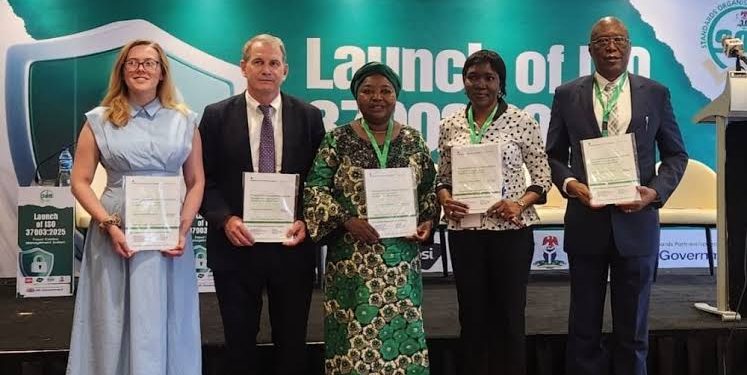The Federal Government has inaugurated the ISO 37003:2025 Fraud Control Management System, a globally recognised framework designed to curb fraud, strengthen business integrity, and boost investor confidence in Nigeria’s economy.
The inauguration ceremony took place on Tuesday in Abuja and was performed by the Minister of Industry, Trade and Investment, Dr. Jumoke Oduwole, represented by Mrs. Jachinma Agu, Deputy Director of Reforms at the Ministry.
Oduwole described the launch as a landmark step in aligning Nigeria’s economic reforms with the President’s Renewed Hope Agenda. She emphasised that the introduction of the standard would play a crucial role in addressing fraud, which she described as “a hidden tax on development.”
“Fraud increases the cost of doing business, erodes investor confidence, and undermines innovation,” she said. “The ISO 37003:2025 transforms fraud prevention from a matter of chance to a matter of systematic design.”
The new framework is designed to help public and private organisations assess fraud risks, implement preventive measures, and respond effectively to incidents. Oduwole urged ministries, departments, and agencies (MDAs) to lead by example in adopting the standard, noting that its implementation within the public sector would enhance transparency and improve service delivery.
She also called on private sector leaders including small and medium enterprises to see the standard not as an additional cost but as “a strategic investment in reputation, operational efficiency, and long-term sustainability.”
“Today, we are planting a tree of integrity whose roots will stabilise our business environment and whose branches will bear fruits of investment, sustainable growth, and shared prosperity,” she added.
Strengthening Governance and Investor Confidence
Director-General of the Standards Organisation of Nigeria (SON), Dr. Ifeanyi Okeke, described ISO 37003:2025 as a strategic tool for promoting transparency and good governance. He revealed that Nigeria played a significant role in developing the standard, first serving as co-convenor and later as convenor of the ISO Technical Committee 309, Working Group 8.
“The ISO 37003:2025 will help organisations prevent, detect, and respond to fraud while embedding a culture of integrity in their operations,” Okeke said. “Fraud has long undermined development, discouraged investment, and eroded public trust. For the public sector, this standard will enhance transparency and reduce leakages, while for the private sector, it will serve as a mark of integrity that boosts credibility with investors.”
Okeke commended the British Standards Institution (BSI) and the UK’s Foreign, Commonwealth and Development Office (FCDO) for their collaboration, saying their partnership was instrumental to the successful publication of the standard. He assured stakeholders that SON would ensure effective implementation through awareness campaigns, training, and a credible certification scheme.
“We must build a formidable wall of integrity against fraud,” he said. “The widespread application of this standard will strengthen the President’s Renewed Hope Agenda, attract investments, and improve Nigeria’s global competitiveness.”
Mr. David Adamson of the British Standards Institution (BSI) described the standard’s development as a landmark achievement for the global business community. He praised Nigeria and the United Kingdom for their leadership roles, noting that ISO 37003:2025 is not just a theoretical document but a practical tool for combating fraud and strengthening transparency.
“The importance of this new standard goes beyond publication,” Adamson said. “What matters most is its effective implementation across organisations. The ISO 37003 is designed as a practical framework that institutions, professional associations, and businesses including SMEs can apply to strengthen transparency, prevent fraud, and protect lives and resources.”
In August, the Central Bank of Nigeria (CBN) issued a directive mandating all participants in the country’s payment ecosystem to complete migration to the ISO 20022 messaging standard and implement mandatory geo-tagging of payment terminals by October 31, 2025. In a circular published on its website, the apex bank reminded Deposit Money Banks (DMBs), Microfinance Banks (MFBs), Mobile Money Operators (MMOs), Switching and Processing Companies, Payment Terminal Service Providers (PTSPs), Payment Solution Service Providers (PSSPs), Super Agents, and other licensed operators that ISO 20022 is now the global benchmark for payments messaging.










